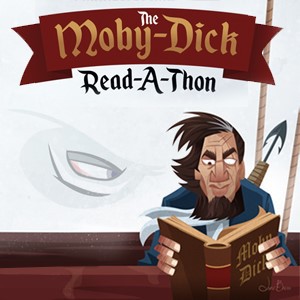UTEP, EPCC Program Plans Whale of a Read-a-thon
Last Updated on November 12, 2019 at 12:00 AM
Originally published November 12, 2019
By Daniel Perez
UTEP Communications
An ambitious effort to bring people together to enjoy what many experts consider one of the greatest American novels ever written was the reason organizers scheduled the "Moby-Dick Read-a-thon" Nov. 14-16 in El Paso.

Brian Yothers, Ph.D., professor of English at The University of Texas at El Paso, said the public could hear a collection of readers from UTEP, El Paso Community College and the region recite the entire 136 chapters to include the epilogue of the book written by Herman Mellville, who was born 200 years ago in 1819.
The ambitious read-a-thon that covers the exploits of Captain Ahab, Ishmael and other Pequod crewmembers on their intense, international voyage to find the white sperm whale will run from 6 to 8 p.m. Thursday, Nov. 14, in the Discovery Theater of UTEP’s Centennial Museum. It restarts at 8:30 a.m. Friday, Nov. 15, in EPCC’s Little Temple, 906 N. El Paso St., and runs through 6 p.m. The event will conclude from 8:30 a.m. to 6 p.m. Saturday, Nov. 16, in the UTEP museum’s Discovery Theater.
Yothers said this type of event is common in sea faring communities such as New York, Pennsylvania, Massachusetts, and California, but added that this might be the first time El Pasoans have tried it. Organizers conceived the idea in spring 2019 and began to plan it this past summer.
“We hope it builds a sense of community around the written word,” said Yothers, a Melville expert and principal investigator of the Humanities Collaborative at EPCC-UTEP, an event sponsor.
Individuals who would like to read a chapter during the event should contact Vincent Martinez, the collaborative’s program manager, at vcmartinez@utep.edu. Participants also could request the chapter they want to read. Chapters range in length from one page to several dozen. This means that participants could read anywhere from a few minutes to approximately 45 minutes. Most of the chapters are in the five- to 10-minute range.
One of the first volunteer readers was Vanessa Zuniga, a junior English major, who signed up to read three chapters – one on each day. The El Paso native is a Humanities Collaborative student fellow, for which she helps organize events that promote literacy. She said this was important because several studies have ranked El Paso low when it comes to literacy.
One examples was a July 2019 article, “Most & Least Educated Cities in America,” on the WalletHub website. It ranked El Paso, Texas, 136 out of 150 metropolitan centers. The researcher used 11 metrics to include adults age 25 with at least a four-year college degree, the quality of the public schools, and the gender education gap.
Zuniga, a first-generation college student, said that she had never read “Moby-Dick” and thought this would be a great way to experience it. She said that Yothers assigned her three medium-sized chapters. She admitted that she had not reviewed them yet, but promised to recite them aloud in front of her mother before her scheduled readings. She said another reason she volunteered was to practice her public speaking and to network with others interested in the humanities, literacy and “Moby-Dick.”
“I think the read-a-thon was a great idea,” Zuniga said. “I’m for anything that will help the community.”
Louie Saenz, KTEP-FM (88.5) news director and UTEP communication lecturer, said he plans to participate. Saenz, who hosts “The Book Club on Perspectives” show at 12:30 p.m. Sundays, said this kind of event could rejuvenate people’s interest in reading.
“This is special,” said Saenz of the event as he pulled his personal 1920s-era, green-covered hard copy of “Moby-Dick” from his office bookshelf. A British publishing house released the original book in October 1851. An American publisher, Harper & Brothers, printed it the next month. Saenz recalled it being required reading in high school and admitted that he was not interested in it at the time. “This is a literary giant that gave us a sense of adventure. We could dive into the novel, if not the ocean.”
EPCC’s Jorge Gomez, assistant professor of English and a Humanities Collaborative faculty fellow, said he was excited because it would be his first read-a-thon, and because “Moby-Dick” is one of his favorite novels.
“(‘Moby-Dick’) is full of insight about human nature, and from a certain perspective, the American Dream,” said Gomez, who earned his bachelor’s and master’s degrees in English from UTEP in 2009 and 2011, respectively.
Gomez picked chapter 32, “Cetology,” because of his love of science, specifically in this case, the complexity of whales. He has promoted this event and said he hoped that students would attend and volunteer to read parts of the novel.
Yothers said the read-a-thon would give the community the opportunity to re-encounter this classic and might encourage people to revisit other classic texts. He was philosophical when asked how he would judge the read-a-thon’s success. He said the achievement is the effort.
“The attempt itself has inherent value,” Yothers said. “Our success is to attempt things that captivate and challenge others … like Moby Dick.”
UTEP’s Centennial Museum and Chihuahuan Desert Gardens is the other event sponsor.